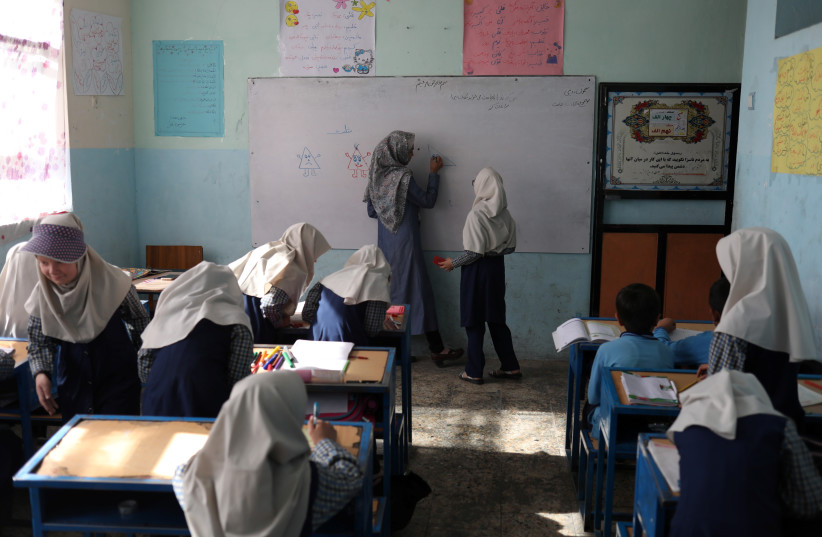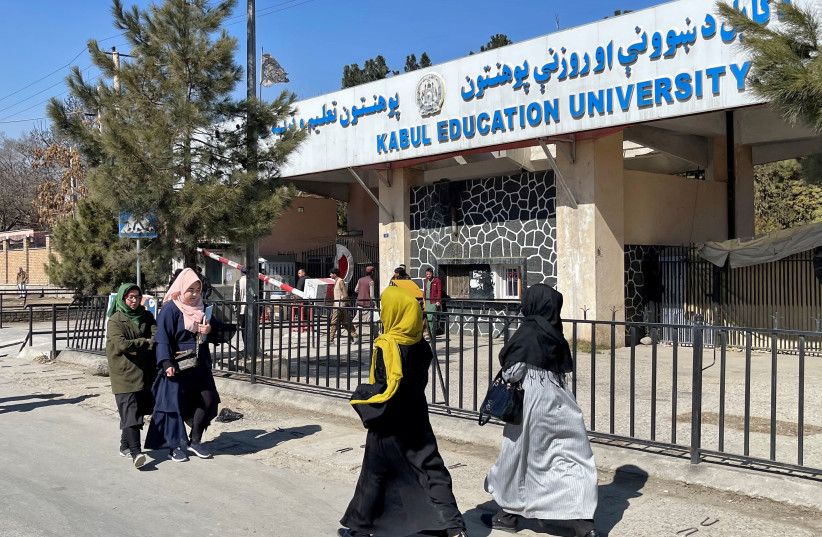“Education is a fundamental right. We are here to give hope to Afghan women,” says Victoria Fontan, the French-born provost at the American University of Afghanistan.
For more stories from The Media Line go to themedialine.org
The American University of Afghanistan (AUAF) is one of the very few universities worldwide that is operating in exile. Originally, it was the first nonprofit private university established in Afghanistan; today, it is the only Afghan institution of higher education that teaches Afghan women despite the Taliban’s ban imposed last month on higher education for women.
What is the AUAF?
Established in 2004, AUAF opened its doors in 2006 and offered Afghan students a variety of options for bachelor’s degrees, and a Master of Business Administration program as well as other higher education programs.
Fontan arrived in the country in 2019. Her academic interest in emerging conflict societies brought her there because Afghanistan was a country trying to achieve sustainable peace at that moment, she told The Media Line.

“As a peace studies teacher, it was a very interesting country and a new challenge to come after other countries where I worked such as Iraq, Somalia, and Colombia,” she said.
Fontan recalls that when she arrived in Afghanistan, everyone was talking about the agreement signed between the United States and the Afghan government in Doha that put on paper the US commitment to the withdrawal of American troops from the country, “but no one thought that this was really going to happen,” she added.
In the meantime, the university made that it continued to fulfill its mission. But during those times there was always a security challenge. “The university was attacked in 2016 by the Taliban and we lost 15 people from our students and staff. There was a permanent threat against the university,” Fontan noted.
“We used to live as if we were in a high-security prison, with high walls, permanent security, with a private army of 150 ‘Nepalese Gurkhas’ guarding the campus at any given moment,” she described, adding that, for the students, it was a risk to come to campus to study.
For the Taliban, Fontan said, the AUAF was the symbol of the American presence in the country, and what they considered an invasion. “For them, it was important to send a political message against this perception of the invasion of Afghanistan,” she said.
The AUAF taught principles of democracy, gender equality, diversity in society, and human rights, “some of the principles that the Taliban do not necessarily believe in,” Fontan said.
During that time, the perception of female higher education in the country was interesting, according to Fontan. She explains that, to a certain extent, education for women was perceived as necessary, but after the takeover by the Taliban “women had another role in society, and it was to be mothers.”
That is why, for Fontan, the most valuable aspect of the university’s mission was that the campus, which was in the center of Kabul, was a space where women could be free. Within their family structure, by contrast, young women usually work on chores around the house and do not have a lot of freedom or independence, Fontan points out.
“We had women from the 34 Afghan provinces, and when they used to arrive at the university, their time belonged to them, they had the liberty of wearing what they want, wearing hijab or not, and even practicing a sport, which was not normal in all the Afghan provinces for women to do,” she said.
Fontan recalls the day when the American withdrawal was imminent and said that leaving the country was a really hard decision for the staff to make. “For us to leave our students, colleagues and community felt like treason to them and to our conscience as humanitarian workers,” she said.
On August 12, 2020, someone called the president of the university to tell him that the New York Times office was leaving, and “they always leave at the last moment,” Fontan said, adding, “I was also called by the French Embassy which told me that it was a matter of days before the Taliban arrive in Kabul.”
“In those last moments, we packed our bags, we said goodbye to everybody, and we burned all of the documents that existed on the campus with names of students or staff, who could be targeted once the Taliban found them,” said Fontan.
She saw the images of people fighting to get on the planes and thought that it would be impossible to leave soon. But she says that she was not afraid. “The Taliban have an ideology and beliefs that I do not necessarily share, but they are human too. So, I was never afraid for my life because I knew that in every situation it would be possible to collaborate, speak to people and find a solution,” she said.
Fontan later boarded a repatriation airplane that France sent to Afghanistan.
Today, the university’s campus is used for Taliban government operations and housing for high-ranking officials and their families. “We know that they are looking after it well: the cats, the flowers. And I hope that one day we can return to it,” she said.

Fontan knows that there currently is a family of Taliban officials living in her apartment. “I left there on purpose pictures of my nephews so that they can also see that we are human too,” she said.
Now AUAF has about 900 students, of which 600 are in Afghanistan – most of them women – and all of them are taught online. And there also is a new physical campus in Doha, Qatar.
AUAF currently receives funding from the US government as well as from the Qatari government, which gave it a space to reestablish the university physically in a compound called Education City. The campus has space for 200 students.
“It is an amazing contribution from the Qatari government, and we are very grateful,” said Fontan, adding that there are students arriving from Afghanistan to the campus in Qatar every week. “It is complex for them, but when they arrive, there are some that cry because they are very happy to be here with us,” she added.
Half of the teachers are Afghan, and the other half are international. “We even have some teachers – men and women – who are still in Afghanistan and teach from there,” Fontan said.
In December 2022, the Taliban banned women from receiving a university education for an indefinite amount of time. The AUAF is currently the only Afghan university that teaches women, but there are other universities around the world that teach Afghan women online.
The university has put in place “advanced cybersecurity measures” for the safety of its students, according to Fontan, “but it is their decision. We give them the opportunities and the tools; they are adults, and they make the decisions.”
The education at AUAF is free and the students receive internationally accredited diplomas from both AUAF and Bard College, a private university in New York.
Afghan students are also provided with phone credits to facilitate studying online. But the real challenge, says Fontan, is access to electricity. “They have the possibility to study in a synchronized way with the rest of the class or watch the recordings of the classes when they do have electricity,” she explains.
The Taliban know what the university is doing, but for now, they are not interfering. “We know that some of our students have family members in the high ranks of the Taliban. Afghan society is multicultural and there are a lot of political ideas flowing in the country. So obviously, we have students from Taliban families,” Fontan said, stressing that not all Taliban members are against the education of women.
“This is very important, and I hope that in the future there are changes in their policies. Also, the Taliban knows that education is important for everybody,” Fontan added.
To hear an in-depth discussion in Spanish on the American University of Afghanistan’s operations in exile, listen to The Media Line’s Spanish-language podcast, Medio Oriente 123, hosted by Debbie Mohnblatt. In the sixth episode, Mohnblatt is joined by Victoria Fontan, provost at the American University of Afghanistan.
